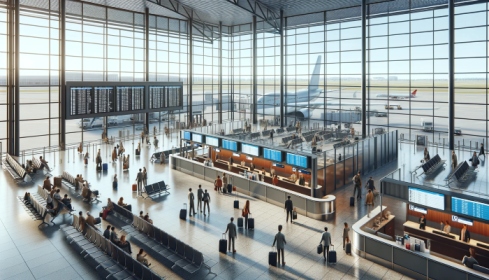Sunday, September 15, 2024 Venezuela, a country blessed with stunning natural beauty and an abundance of resources, faces a complex challenge in its tourism industry. Despite being home to breathtaking landscapes, diverse ecosystems, and rich cultural heritage, the nation struggles to draw international visitors. Its vast resources, including some of the world’s largest oil reserves, fertile lands, and unique biodiversity, should position it as a top travel destination.
However, a sharp decline in aviation connectivity has left Venezuela’s tourism sector isolated and underdeveloped. The situation worsened on July 31 when commercial flights to key tourism gateways like Panama, the Dominican Republic, and Peru were suspended. This decision resulted in a staggering 54% drop in international connectivity, significantly impacting the country’s ability to attract tourists.

Weekly international flights were slashed from 181 to just 83, leading to 15,000 fewer seats available and delivering a severe blow to both the tourism sector and the wider economy. There had been a glimmer of hope recently as new airlines began operations and international tourists started showing renewed interest, drawn by promotions of Venezuela’s hidden gems. However, political instability, particularly around the July elections, disrupted this fragile recovery.
The suspension of crucial flight routes further isolated Venezuela, making it increasingly difficult for travelers to reach the country and stunting growth prospects in the tourism industry. In response to these setbacks, charter flights have emerged as a temporary lifeline, attracting visitors from new markets such as Russia, Poland, China, and Trinidad. While this has provided a modest boost, the long-term sustainability of Venezuela’s tourism sector relies on the return of regular commercial flights.
Consistent connectivity is essential for building a robust tourism framework that can support lasting growth, allowing Venezuela to fully capitalize on its natural and cultural assets. Two decades ago, Venezuela was a thriving destination for European and American tourists, celebrated for its vibrant cities, cultural richness, and stunning beaches. However, the rise in crime rates in the 2010s and a subsequent humanitarian crisis led to a sharp decline in visitor numbers.
Today, traveling to Venezuela is not only logistically challenging but also expensive. Flights from London to Caracas can range from £627 to £969. Even once inside the country, tourists face high costs; dining out in Caracas can cost between $100 and $150 per meal, an unattainable luxury for most locals who earn an average monthly income of around $3.
50. Although crime has decreased and some aspects of daily life have improved, high travel costs, ongoing political instability, and unreliable public services continue to deter potential visitors. Many businesses, particularly in the hospitality sector, have had to adapt by installing backup power generators and water systems to mitigate the impact of unreliable public utilities.
However, the recent flight suspensions have delivered yet another blow to an already struggling tourism industry, further diminishing its potential for recovery. Venezuela’s tourism paradox—a nation rich in natural and cultural wealth, yet struggling to draw visitors—highlights a complex interplay of geopolitical and economic challenges. The lack of aviation connectivity, combined with political instability, casts a long shadow over the country’s tourism future.
However, with stronger international relations and strategic governance, there is still hope that Venezuela can reclaim its place as a top global travel destination. The path to recovery is fraught with difficulties, but for a nation with so much to offer, it’s a journey worth pursuing to revive its tourism industry..



















